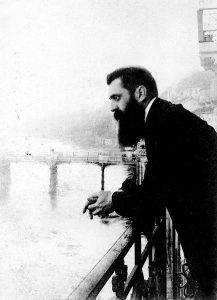
This August, the World Zionist Organization – ההסתדרות הציונית העולמית will celebrate its 125th anniversary. It was founded as the Zionist Organization at the initiative of Theodor Herzl at the First Zionist Congress, which took place in August 1897 in Basel, Switzerland. This summer, the convention will seek to symbolically “reconstruct” that first congress, with a hologram of Herzl standing on the balcony where he made his famous speech. There will be many dignitaries there, and many speeches, but after 125 years, Zionism still baffles many people, who ponder its meaning and where to position themselves with regard to it.
I was asked to contribute my message concerning Zionism but declined to do so for a very simple reason: Such events have no significance. They are assemblies of politicians who do not come to listen but to show themselves. They will not absorb messages that do not serve their interest.
Nevertheless, if, theoretically, I were to present my understanding of Zionism, as I had learned it from my teacher, RABASH, I would emphasize that Zionism does not refer directly to the Jewish people, but rather to all of humanity.
The Hebrew word Zion comes from the word yetzi’a, which means exit. The people of Israel formulated their unique cohesion through repeated entries into a state of union and exits from it. Through their constant struggle to reenter the state of unity, the ancient Hebrews built a unique nation that extols the value of unity above all else. Since the ancient Hebrews came from all the nationalities that existed in the ancient Near East and Mediterranean, their union formed a miniscule “world peace,” where people of vying, and often hostile, faiths and cultures were able to unite and care for one another above their initial differences.
This is why the Israeli nation was tasked with being “a light unto nations,” to show the world that war is not the right way for nations to exist, but there is an alternative of peace and mutual concern. This is also why the most fundamental tenets of Judaism concern social rules such as “That which you hate, do not do unto others,” “Love your neighbor as yourself,” concern for the poor and weak, and mutual responsibility.
Zionism, therefore, is not a nationalistic ideology. Rather, it is the disposition of an individual to fight against one’s sense of separation from others and form a union that binds all people into one.
The great kabbalist and thinker Baal HaSulam, who was also my teacher’s father, wrote in the early 1950s, shortly after the establishment of the State of Israel: “Judaism must present something new to the nations. This is what they expect from the return of Israel to the land!” Later, he explained that that new thing is the unique unity of the Jews—unity above all differences. This, he wrote, would “unite all the nations to be as one, helping one another,” and will endow us “with tolerance to one another.” Our unity, the unity of the Jews, “would certainly prove to the nations the rightness of Israel’s return to their land, even to the Arabs.”
Since the inception of the Zionist movement, unity of all the Jews has never been its goal. This, in my view, has been its primary drawback. If the ultimate goal of Zionism is not to unite the entirety of the Jewish nation in order to serve as a model of solidarity above differences, then, as Baal HaSulam wrote, “Zionism will be canceled altogether.”
Since currently division prevails among us, the value of Zionism in the eyes of Israelis and Jews around the world is fittingly poor. And since we do not appreciate the calling of the Jewish people—to be a model of unity—the world does not appreciate Jews. “[A] return such as today’s,” wrote Baal HaSulam in those early years, “does not impress the nations whatsoever, and we must fear lest they will sell Israel’s independence for their needs.”
If this was true in the early 1950s, when Israelis were still Zionists, even if they could not agree on the meaning of the word, we can only imagine the kind of odium we are evoking in the world today, when our only “vision” is to become a rich country, a “startup nation.”
We must return from the yetzi’a, the exit, and re-enter unity. We must restore the original meaning of the word “Zion,” and live up to our vocation. It has nothing to do with land, with religion, or with faith. Just as our ancestors came from every faith and creed in the Fertile Crescent, all we need in order to understand the meaning of Zionism is to aspire for unity above all differences.
Posted on Facebook